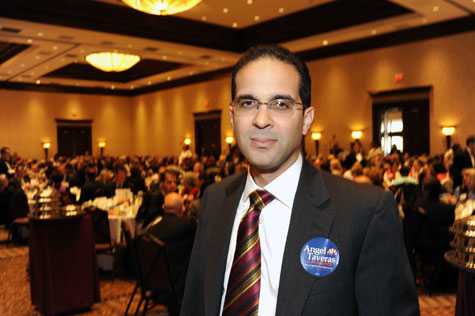
FROM HEAD START TO HARVARD “It’s the story of Providence, it’s the story of Rhode Island,” says Taveras. “It’s the story of America.” |
Until recently, to talk about Angel Taveras was to talk about the future.
That is not to say that Taveras, 39, is a man without a past. A Harvard-educated lawyer who grew up in Providence’s impoverished South Side, he first entered the public con-sciousness a decade ago when he made a youthful bid for Congress, losing out to then-Secretary of State James Langevin.
And his name surfaced now and again in the years that followed. He worked as an election lawyer for local pols like Cranston Mayor Allan W. Fung, a moderate Republican, and Democratic presidential aspirant John Edwards.
And he stayed plugged in to the political game. Providence Mayor David N. Cicilline named Taveras a housing judge a few years back. And as a lawyer for Lifespan, the hospital operator, he was a regular at City Council meetings.
But Taveras was a low-key presence, for the most part. A man with potential. The guy who might, one day, become the first Latino mayor of the capital city, insiders opined.
Well, that one day — his supporters say — may suddenly be here.
When Congressman Patrick J. Kennedy stunned the political firmament in February with the announcement that he would not seek re-election, Cicilline quickly abandoned his own re-election bid and hopped into the Congressional race — setting off a scramble for his City Hall suite.
And in a matter of weeks Taveras locked up support from key players on the tony, liberal East Side and the heavily Latino South Side. The endorsements from former gubernatorial candi-date Myrth York and State Senator Juan Pichardo, among others, marked an important first step in replicating the progressive coalition Cicilline put together during his first mayoral run in 2002.
But it also meant that potential rivals for that coalition were out of the running. And in a multi-candidate race with a fractured electorate, clearing the way to a solid bloc of voters may be the most important task.
Indeed, part of what makes the little-known lawyer’s bid plausible is the problem of overlap facing his two major announced Democratic rivals, City Councilman John J. Lombardi and State Representative Steven Costantino.
The two men — one a gladhanding critic of the Cicilline administration, the other an influential Smith Hill insider — are neighbors on Federal Hill. They will be competing for votes in their own backyard and more broadly, observers say, for the votes of traditional white ethnic voters citywide.